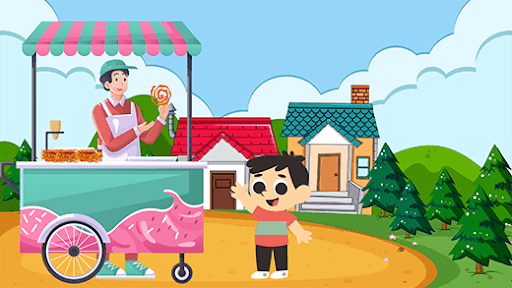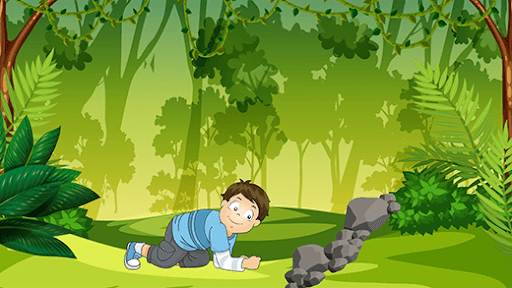An Overview of Class 8 English Jalebis Worksheets
The chapter Class 8 English Jalebis Worksheets is not just about sweets—it's a story that teaches you about choices, temptation, and the importance of thinking before you act. As you read, you'll step into the shoes of a boy who faces tricky situations and learns life lessons along the way.
If you ever feel confused about chapter themes, these questions with answers will make it much easier. Practicing with Vedantu’s easy-to-download PDFs will help you answer both textbook and tricky exam questions confidently. Want to brush up on the entire syllabus? You can always check the Class 8 English Syllabus for a quick overview.
Working through these worksheets is a smart way to prepare for exams, clarify doubts, and score better. For more practice, don't forget to visit the Class 8 English Important Questions page and try out some extra questions.
Access Worksheet for Class 8 English Chapter 8 - Jalebis
1. When he brought money to a school that day, why didn't he pay the school fees?
2. What message did he receive from the coins?
3. Do you believe they misled him?
4. Why didn't he follow the advice of the coins? Describe two or three causes.
5. What did he learn from the oldest coin?
6. Did he follow his recommendations? If not, why not?
7. He carried the coins home in his pocket. What happened next?
8. Why didn't he consume every one of his purchased jalebis?

Boy purchasing Jalebis
9. How did he dispose of the remaining jalebis?
10. It was killing me to be afraid. What caused the fear?
11. The stomachs of children function like digestive machinery. What exactly do you mean by that? Do you agree?
12. I assume the boy is intelligent. If yes, what evidence supports it?
13. The story develops because:
The narrator stole some Rupee.
He was given four Money.
The set day for collecting the school fee was impossible.
Any other
14. The child was tempted to buy jalebis but while returning from school
He managed his greed.
He Goes to the Sweet shop.
He sat down and thought.
Any other
15. What initially caused the young child to resist his desire for jalebis?
The fear of instructors.
His family's Status.
The fears of physical violence.
16. The child explains, "The coins were very ready to be spent that day. It's accurate.
The coins are silent.
The kid was crazy.
The youngster's greed was growing.
Any other
17. What did he discover beneath the rock?
One rupees
Two rupees
Four rupees
Any other

Boy discovering something beneath the rock
18. What was said to Munna by the oldest rupiya?
19. Fill In the blanks:
It had been made known by Munna's teacher that he would collect the fees during the ___.
The teacher who handled the fee collection was ___.
He cannot spend his ___ money on sweets.
His first advice was to never cross any _____ tracks.
20. Who is the writer of lesson Jalebis Class 8?
21. Complete the sentences:
According to the narrator, his teacher had strict disciplinarian__
The coin suggested that he spend the money on jalebis but ___
22. How was the scholarship awarded to the narrator?
23. What does "for a child of such standing" signify in the narrator's words?
24. What caused his "head to keep spinning"?
25. How was he able to avoid being punished?
Answers to the Worksheet:
1. The teacher who handled the fee collection was absent. As a result, he was spared paying school fees that day. The instructor was a man by the name of Master Ghulam Mohammed.
2. He was questioned by a Rupian about what he was thinking. He really does need to sample some hot, fresh jalebis. They are intended to be consumed. Those with cash in their pockets are welcome to devour them.
3. Yes, they were misguiding him. This is so since the money was intended to pay for his educational expenses.
4. The instructions regarding the money were ignored by him. The money was used to cover the cost of tuition. He suddenly started to fear his teacher. If he got upset, he would keep him on the bench. Moreover, he believed it was inappropriate to even search the bazaar for anything.
5. The oldest coin gave him advice for his own benefit. If he didn't feel like eating those hot jalebis, he asked didn't feel like eating those hot jalebis, he asked. He would receive the scholarship the following day if he spent the money that day.
6. He didn't heed his advice. He considered what he was saying to be inappropriate. Even if the sight or idea of jalebis made his mouth water, he exercised restraint. He was an unusual type of boy, which was the reason. He was one of the class's most talented students. Even better, he was awarded a scholarship worth four rupees every month. In addition, he was from a wealthy family.
7. He sat on the bed when he got home. The coins started to talk. They began to scream as soon as he went inside to have lunch. He ran in the direction of the market because he was so tired. He quickly instructed the hallway to give him enough jalebis to equal one rupee.
8. He spent one rupee on a large number of jalebis. He ate a lot of jalebis. He was unable to have any more jalebis because of his extreme fullness.
9. The neighbourhood boys had collected in the galoot. He started giving out the jalebis to the group.
10. He had trouble digesting all the jalebis he had had. Every breath produced a burp. There was a chance that the burp could release one or more jalebis. He was dying of terror.
11. It indicates that young children's stomachs operate effectively and efficiently. Even if they overeat, they can digest food easily. But I disagree with this point of view. A child who overeats will have indigestion. Munna, though, might have a different experience.
12. The kid was smart. The fact that he had gotten a scholarship proved it. He was one of the smartest kids.
13. The set day for collecting the school fee was not possible.
14. He managed his greed.
15. His family's Status.
16. The youngster's greed was growing.
17. Four rupees.
18. The eldest Rupiya claimed that they were attempting to convey helpful information to him. With the cash in his pocket, he should have some jalebis. With the scholarship money he would get, he could cover the costs.
19.
Break
Absent
Fee
Railway
20. Ahmad Nadeem Qasmi.
21.
Also, he would stand till the end of class on the bench.
That he could use the scholarship money to pay the fee.
22. Because he was one of the most outstanding students, the narrator was awarded the scholarship. He earned a scholarship worth four rupees per month for passing the fourth-grade exams.
23. The storyteller was raised in a respectable family. Second, he had a scholarship because he was a bright student.
24. In the joyful expectation that he would receive his scholarship that day, the narrator arrived at school. The following month, though, was when he would receive payment for his scholarship.
25. The teacher told the students that he would be collecting the fee during the break. Because of his fear, the narrator went to the Kumbelpur railway station while lifting his bag.
What You Will Learn From the Chapter Jalebi?
This chapter has a very meaningful storyline that will help students see life from different perspectives. There are multiple benefits to understanding this chapter, and some of them are listed below:
In the lesson, the jalebi summary teaches us to share everything. It is narrated in the story that the boy did not eat the jalebis alone; he bought them for his fellows as well.
Students will also learn the importance of making the correct decision at the right time.
One of the most important morals this chapter conveys is 'look before you leap, which means do everything after analysing the future consequences.’
Chapter Jalebi will help children enrich their minds with practical aspects of life and the importance of facing the consequences of your own decisions.
Some Examples and Exercises Based on Jalebi Questions and Answers
Here are questions and answers based on the chapter on the Jalebi. Students can go through these questions and practise them.
A. Answer the following questions.
1. What did he do with the remaining jalebis?
Ans: He distributed the remaining jalebis to the boys in the neighbourhood.
2. What were the coins saying to the man?
Ans: The coins were trying to convince the boy to buy jalebis. The coins in his pocket said Jalebis were meant to be eaten only with the money in his pocket.
3. What did the old coin say to the boy?
Ans: The old coin said the boy could pay the school fees the next day after getting the scholarship.
B. State true or false.
The boy did not eat the jalebi from his school fees _____.
The old coin did not say anything to the boy_____.
The boy eats the jalebis alone______.
The boy was tempted to eat chocolates______.
Download A Free PDF with Jalebi In English Answers
PDFs are the best way to encourage students to study to make learning fun and easy. It only makes understanding the chapters easier, but it is also less time-consuming. There are various advantages of using Jalebi worksheets, and some of them are listed below:
PDFs are the best choice to encourage students to learn the chapter in a better way. It is easy to download and has different exercises from the chapter.
The PDFs are absolutely free and can be downloaded from Vendatu's website.
The PDF has the lesson summary and quick jalebi questions and answers to help the students do last-minute revisions.
Another advantage of these PDFs is that they are portable. Students can easily carry these with them anywhere.
Students can also take the printout of these PDFs and learn the jalebi summary at their convenience.
Lastly, to ensure students get good marks in their exams, the expert teachers at Vedantu created a free PDF with Jalebi worksheets. These PDFs and worksheets will act as a blueprint of the chapter and help students clear their concepts easily. It is best for the learners to use the best study materials and the right pdfs to score good marks in English.
FAQs on Class 8 English Jalebis Worksheets
1. What is the lesson we learn from the chapter Jalebis?
The lesson we learn from the chapter Jalebis is that you should consider the consequences before making any decision as it can cause you trouble in the future.
2. What did the boy do after eating the jalebis?
After eating jalebis, the boy prayed to God to give him five rupees for his school fee.
3. Did the boy eat all the Jalebis alone?
No, the boy did not eat all the Jalebis alone. The boy shared the remaining jalebis with the boys assembled in the gali.





















